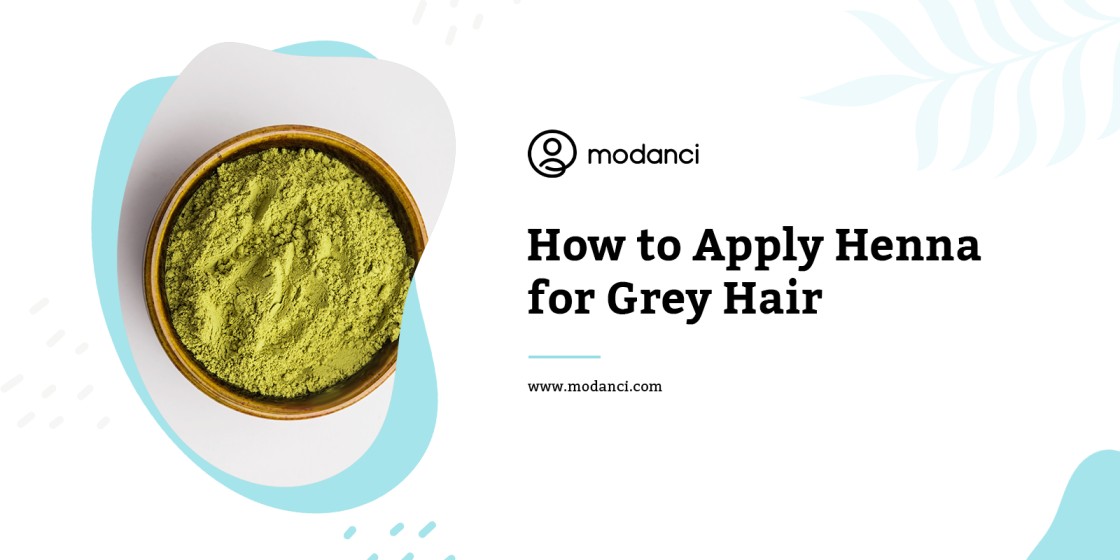Among several other features, hair is important in one’s body and appearance. Greying of the hair is a reasonably prevalent problem, second only to hair loss and balding. Everyone experiences greying of hair at some point in their life; for some, it is sooner than others. Hair greying or canities happens to everyone regardless of gender, race, or even age.
Henna is considered one of the safest options for colouring hair and skin. In this blog post, we will guide you through the benefits of henna, the types of henna, and applying henna for grey hair, helping you achieve a beautiful and vibrant colour while nourishing your locks.
What is Henna?
Henna, a natural plant-based dye, has been used for centuries to colour hair and is an excellent option for those seeking a safe and chemical-free alternative. Most Indian households are familiar with Henna, a natural and vegan dye derived from the mignonette tree or shrub that can be applied to our hair, body, and clothes.
The process involves extracting henna from the plant leaves and grinding them into a fine powder. This powder is combined with different liquids to create a paste-like mixture of the desired consistency and colour.
Henna vs Hair Colour
A wide range of hair colouring options are available in the market. But why should you choose henna over conventional hair dyes? Henna stands apart from hair dye due to its unique composition and effects. Henna and hair dye differ significantly in their composition and impact on hair.
Here are some distinctions between henna and hair dye:
- Composition: Henna is derived from dried and crushed henna plant leaves, mixed with water to form a paste. Hair dye, on the other hand, typically contains synthetic chemicals like ammonia, peroxide, and other additives.
- Safety: Henna is considered safer than hair dye due to its natural origin and absence of harsh chemicals, reducing the risk of hair and scalp damage. It also has a lower likelihood of causing allergic reactions compared to hair dye and is recommended for people with sensitive scalps.
- Hair Health: Henna possesses conditioning properties that nourish and strengthen the hair. It can aid in promoting hair growth and reducing dandruff. In contrast, hair dye can damage the hair, leaving it brittle and dry.
- Longevity: Henna provides long-lasting colour, typically lasting several weeks before gradually fading. Synthetic hair dyes might last longer, but they always come with a possibility of side effects.
- Effects on Hair: Henna creates a protective layer around the hair shaft, resulting in firmer, voluminous, and shinier hair. On the other hand, chemical-based dyes are not made to create any protective layer around the hair.
So, if you are contemplating whether henna is better than hair dye, the answer is yes! Particularly if you desire a natural, plant-based product that enhances hair health while providing long-lasting colour.
Types of Henna
Before we dive into the application of henna, let us understand the various types of henna that are commonly used for self-care and beauty purposes. Henna is used for many purposes; Ayurveda also prescribes the application of henna to feet for reducing heat or ushnata. But we will focus on the types of henna used for beauty-related purposes.
There are three primary types of henna which include:
1. Natural Henna
Natural henna produces a vibrant brown-red stain upon application and typically lasts approximately one week on the skin. It is made solely from the leaves of the Lawsonia Inermis plant. It is also known as red henna. It is an excellent choice for those who want to dye their hair without causing additional damage.
2. Neutral Henna
Neutral henna, or Cassia Obovata, is not pure henna powder. It is derived from a different plant called Senna Italica. Although natural and neutral henna plants may resemble each other, their properties and molecular consistency differ. Neutral henna, when used alone, does not alter the hair colour. It is primarily used as a natural conditioner.
3. Black Henna
Black henna is a distinct product that combines indigo, natural henna, and other undisclosed dyes or chemicals like para-phenylenediamine (PPD) to create a black dye. While primarily used for fabric dyeing, manufacturers have started using it to produce henna tattoo cones and hair dye due to its darker colour.
However, it is essential to avoid black henna containing PPD (para-phenylenediamine) for sensitivity and safety purposes, as it is known to cause chemical burns and allergic reactions when in contact with the skin.
Additionally, henna hair dyes are available that are formulated for specific shades, ranging from light brown for brunette tones to vibrant shades like orange-red.
How to Apply Henna?
The majority of henna hair dyes are typically available as a pure powder. The general procedure involves mixing the powder with a liquid to create a paste, as the henna powder’s guidelines instruct. Various options such as water, olive oil, lemon-water mixture, black tea, and more can be used as the liquid component.
While applying the product to your hair (taking care to avoid staining your skin), leave it on for the desired duration and then rinse the dye to reveal auburn or red-brown locks. Similar to the results obtained from a box dye, the intensity of colour may vary depending on your original hair colour.
Here is a guide on using henna to cover grey hair:
Start by gathering the necessary ingredients listed below.
- 1-2 tablespoons of black tea leaves
- 2-3 tablespoons of henna powder (adjust quantity as needed)
- 2-3 cups of water
- ½ teaspoon of lemon juice
- Applicator brush
- Mixing bowl
- An old t-shirt
Step 1: Boil Black Tea Leaves
Bring water to a boil and add the black tea leaves. Allow it to simmer on low heat until the water reduces by half. The amount of water should correspond to the quantity of henna powder used. Opting for natural henna powder instead of those with a developer is advisable.
Step 2: Prepare the Henna Mask
Soak the henna powder in water for approximately 8 hours or overnight. Mix the henna paste with the brewed black tea and lemon juice. Optionally, you can add amla powder to the mixture.
Step 3: Apply the Mask
To prevent staining, split your hair into sections. Use the applicator brush to apply the henna mixture from the roots to the tips of each section. Repeat this process for all sections. Cover your hair with a disposable shower cap and allow the paste to be absorbed for 30 minutes.
Step 4: Rinse It Off
Avoid shampooing immediately to allow the colour to settle. Thoroughly rinse the henna paste off with cold water. Ensure all residue is removed, and apply a conditioner to your hair. You can shampoo your hair the following day. Since henna is not a permanent hair dye, it can be reapplied once or twice a month.
Conclusion
Chemical-based hair dyes may offer more colours, but that comes at the cost of various possible side effects. These hair dyes may also be easier to prepare, but henna is an age-old trusted natural remedy that has been tried and tested for generations.
Apart from giving a rich colour to your hair, what makes henna a great alternative is that it also nourishes your hair. This blog does not claim that all chemical-based dyes are harmful, but it only suggests that henna is always the safer and more natural choice.
Modanci’s Potensified Ayurvedic Solution For Premature Hair Greying effectively helps reclaim your natural hair colour. The kit includes a Handcrafted Organic Jatamansi Kokum Shampoo Conditioner Bar, an Ayurvedic Hair Oil, and Hair Tablets. Answer a few questions and unlock a combo that reverses premature hair greying!
FAQs
1. What colour henna is best for grey hair?
(Product plugin)
2. What should I mix with henna for grey hair?
Henna can be mixed with black tea, lemon juice, and amla powder. Some preparations include coffee.
3. How long does henna last on grey hair?
Waiting 24 hours before shampooing your hair after the henna process is recommended for optimal results. The full colour will become visible within 72 hours and typically remain vibrant for 8-12 weeks.
Read More:




